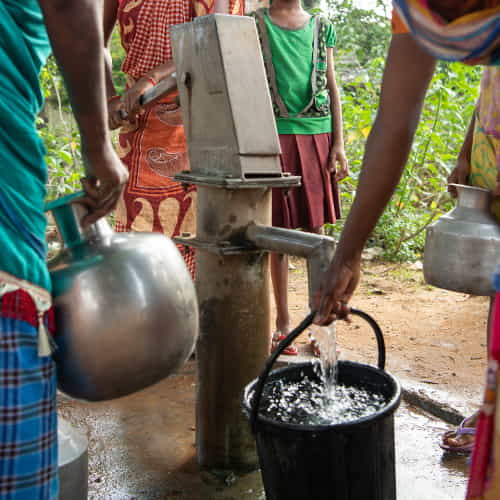
Well Drilling
Water wells can be a life-saving solution that provides safe water for entire communities. Well drilling is an efficient and cost-effective practice.
What is water well drilling? Well drilling is the process of drilling a hole in the ground to create access to groundwater for communal use; it frequently requires equipment like backhoes and drill rigs. Drilled wells are the deepest and safest types of wells.
There are various types of wells:
- Dug well — Dug wells are shallow holes in the ground dug by shovels or picks. Workers line dug wells with stones, bricks or concrete to prevent cave-ins and then cover the well to protect the water source. Dug wells are shallow; soil, pollutants and human activity nearby can easily contaminate these wells.
- Driven well — Workers construct driven wells by pushing a small pipe into soft soil or sand. Workers attach a small screen or filtering system to the end of the tubing in the ground to filter small rocks and other debris from the water. Workers must replace the water filter regularly.
- Drilled well — Drilled wells are the most common wells today. These wells are drilled anywhere from 20 to 1,000 feet down by machinery. Installing drilled wells is relatively inexpensive and efficient; workers can drill a well quickly. Drilled wells require less maintenance and protect the water from surface contaminants.
Wells provide safe water for drinking, cooking, irrigation and industry. Water is essential to human bodily functions and everyday tasks—bathing, cooking, cleaning and even drinking. If water is not easily accessible, is only available in limited portions, or is highly contaminated, entire communities can be affected.
Contaminated water can harbor illnesses like cholera, dysentery and rotavirus.1 All three of these infections cause severe diarrhea and vomiting, which can cause dehydration and even death. According to the WHO, a staggering “829,000 people die each year from diarrhea because of unsafe drinking-water, sanitation, and hand hygiene.”1
Water can also contain harmful chemicals like pesticides, lead, human waste and much more. Contaminated water is a global health crisis. According to the WHO, 663 million people worldwide do not have safe and accessible drinking water.1 Every person without access to safe drinking water is at risk for infection, illness and even death.
Communities in deserts or dry climates often suffer when surface water sources dry up. Drilled wells provide crucial clean water even in places with extreme heat and drought.
GFA World has completed well drilling for communities across Asia and Africa for more than 20 years.
GFA World hires a local contractor with experience and equipment to drill a well near a church. The contractor will drill the well 200 meters or more underground using a drill rig or other equipment and install an India Mark II model hand pump. The India Mark II is a heavy-duty and durable hand pump designed for heavy, daily use.
Jesus Wells can last for around 20 years and provide clean water for 300 people daily. Jesus Wells can operate for 20 million cycles before they need routine repairs.3 Workers drill Jesus Wells in specific villages, but people from other communities, religions and backgrounds will walk miles to collect clean water from a Jesus Well.

GFA World drills Jesus Wells near churches so local pastors and churches can maintain the wells and use them to minister to the local people. Church workers regularly monitor wells and perform routine repairs, like replacing the rubber seals, lubricating the hand pump and protecting the ground around the well.
Many people wonder the cost—how much to drill a well through GFA World? On average it costs approximately $1,400 to install a Jesus Well. One of GFA World’s Jesus Wells can last up to 20 years and provide water for 300 people every day—that’s roughly $5 per person!
The price of a Jesus Well pays for local supplies, materials and equipment; the money also pays the salary of a local laborer for well drilling.
Clean water is a life-changing resource that protects communities from disease, dehydration and the resulting malnutrition.
How can we provide access to clean water?
Consider supporting GFA World’s clean water initiatives, which bring thousands of Jesus Wells and BioSand filters that supply life-giving clean water to people worldwide.
- Jesus Wells — Jesus Wells can be a life-saving resource for many families to protect them from dehydration, lack of sanitation and even severe disease.
- BioSand filters — For only $30, GFA World can manufacture and distribute one of these effective filters to a water-compromised family in Asia or Africa and provide them with clean, safe water for years to come.
Please join GFA’s efforts to provide clean water to communities worldwide!
Learn more about access to clean water1 “Drilled Wells.” Sustainable Sanitation and Water Management Toolbox. Accessed 27 February 2022. https://sswm.info/sswm-solutions-bop-markets/affordable-wash-services-and-products/affordable-water-supply/drilled-wells.
2 “Water, Sanitation, and Hygiene (WASH).” World Health Organization. Accessed 27 February 2022. https://www.who.int/health-topics/water-sanitation-and-hygiene-wash.
3 “Clean Water.” GFA World. Accessed 27 February 2022. https://www.gfa.org/water/jesus-wells/.
